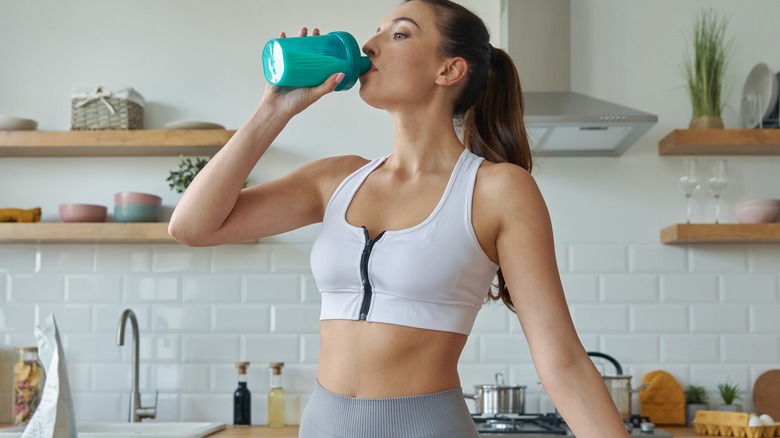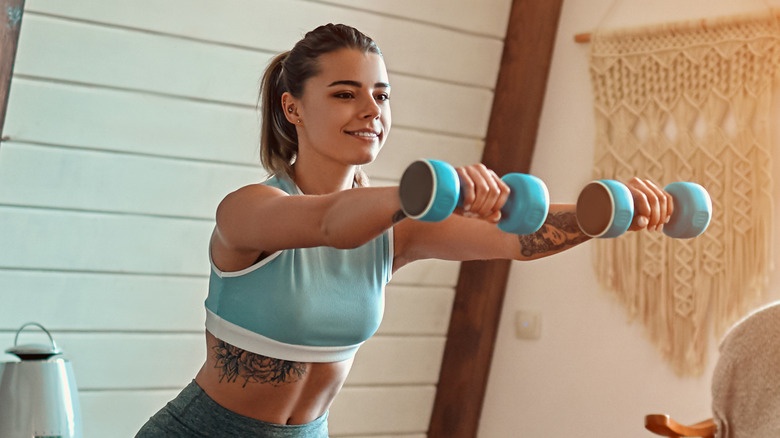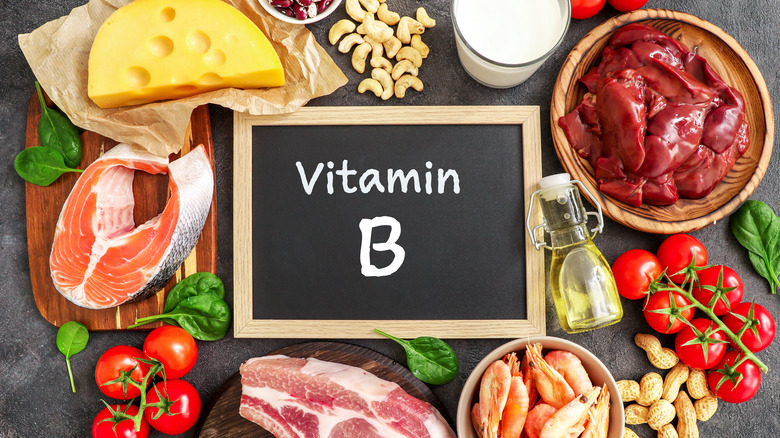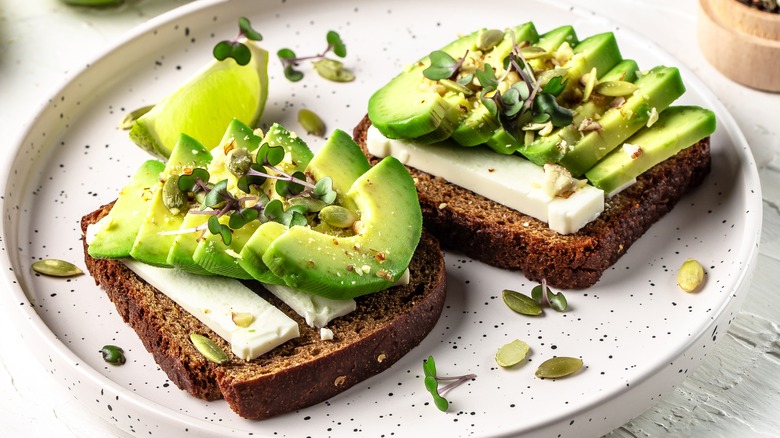What Vital Proteins Can And Can't Do For You
Vital Proteins kicked things off in 2013 with its flagship collagen peptide supplement (via Forbes). The company's founder, Kirk Seidensticker, developed the product after conducting extensive research on how to heal the joint pain that was prohibiting him from running. Since then, the company has expanded its line to include an array of collagen products, as well as various other supplements for beauty, hair, sleep, immunity, and more.
Nestlé Health Science purchased Vital Proteins in 2020, and mega-celeb Jennifer Aniston signed on as the company's Chief Creative Officer in the same year (via Forbes and Women's Wear Daily). With annual sales reaching around $175 million, it's clear that there's a huge market for the products and many happy customers (via Zoom Info).
But just how effective are these supplements, and what exactly can they do for you? Should you shell out your hard-earned dollars for them, or is there an equally effective and less expensive way to achieve optimal health? Let's take a look at exactly what you can and can't expect if you start taking Vital Proteins.
It can boost joint and bone health
Collagen, a protein, comprises a large part of your body's tissues, including your bone and muscle mass. In fact, your bones are primarily composed of collagen, which provides a framework and structure with the addition of a small amount of calcium (via the National Institutes of Health).
As you age, you naturally lose bone mass and strength. According to the Cleveland Clinic, by the time you turn 40, you could be losing approximately 1% of your body's collagen annually. This loss contributes to joint stiffness and wear and tear on cartilage. Fortunately, there are many things you can do to prevent this, including weight-bearing exercise (via NIH).
Collagen supplements can also help. Per results from a 2018 study in the journal Nutrients, post-menopausal women who took 5 milligrams of a collagen supplement daily for 12 months saw increased bone mineral density and favorable alterations in bone markers that indicated increases in the formation of bone and decreased bone degradation. Additional research shows that supplementation with collagen peptides may be helpful in reducing the risk of bone and joint diseases (via Seminars in Arthritis and Rheumatism).
It can promote muscle growth
About four-fifths of muscle is made up of protein (via Otsuka Pharmaceutical). Eating plenty of high-quality protein from lean meat, fish, eggs, beans, nuts, seeds, and whole grains, as well as engaging in regular resistance-training exercise (such as lifting weights), is the best way to protect and build muscle mass and strength as you age (via Harvard T.H. Chan School of Public Health and Landmark).
Taking protein supplements, including collagen peptides like those found in Vital Proteins, can also help. Combining collagen supplementation with resistance exercise can have an even more profound effect on building muscle mass and strength, per results from a 2019 study in Nutrients. During the 12-week trial, young men who engaged in resistance training and took collagen daily gained more mass and strength than men who only engaged in resistance training. A 2015 study in The British Journal of Nutrition found similar results in a 12-week trial involving older men with sarcopenia, or age-related muscle mass loss. Those who performed resistance training and took collagen had better results at the end of the trial than those who only did resistance training.
It can promote heart health
Just as it does for bones and muscles, collagen provides structure and support to your arteries, which are responsible for bringing blood to and from the heart. Without adequate collagen, your arteries can lose flexibility and elasticity (via StatPearls).
A 2017 study in the Journal of Atherosclerosis and Thrombosis found that six months of collagen supplementation helped reduce arterial stiffness and increase levels of high-density lipoprotein cholesterol (HDL) in a group of healthy adults. HDL is a beneficial type of cholesterol that can help rid the body of the artery-clogging low-density lipoprotein cholesterol (LDL), according to the Centers for Disease Control and Prevention (CDC).
More research is still necessary, but researchers concluded that supplementation could help prevent and treat atherosclerosis, which is a build-up of fatty plaques in the artery walls that causes the arteries to narrow and become blocked and potentially results in blood clots (via the Mayo Clinic)
It can improve your skin and hair
With its role in providing structural integrity to all your body's tissues and its benefits for muscles and bones, it should come as no surprise that research has shown collagen to be effective at enhancing skin and hair health.
Ingested collagen can reach the blood, but there was some doubt about whether it could actually reach the skin. A 2017 study in the Journal of Agriculture and Food Chemistry confirmed that it can. Additionally, a 2014 study in Skin Pharmacology and Physiology found that supplementation with collagen peptides had significant beneficial effects on skin elasticity and some beneficial effects on skin moisture. Research conducted in 2016 showed that collagen peptide supplementation improved skin moisture, elasticity, wrinkles, and roughness. Vital Proteins' Beauty Boost product also contains vitamin C and biotin, two nutrients that have shown to be effective at improving skin health (via Harvard Health and WebMD).
Research on supplemental collagen's effects on hair is less extensive. However, collagen provides amino acids that your body needs to make the protein keratin, of which hair is composed (via Healthline). Collagen is rich in one amino acid called proline that is especially important for healthy hair. Collagen also has antioxidant properties that can help fight damage to the hair from free radicals. Stress, pollution, poor diet, alcohol consumption and other lifestyle and environmental factors can cause free radicals to form in the body and damage healthy cells.
It can add protein to your diet
Consuming enough protein is crucial for building and repairing bones, skin, muscles, and cartilage; enabling oxygen circulation throughout the body; healthy digestion; and hormone regulation (via Piedmont). Protein also plays a role in sports recovery and weight loss and maintenance. If you're active or older, you may have increased protein needs, which can make supplemental protein helpful (via Today's Dietitian).
Vital Proteins' original collagen peptides supplement contains 18 grams of protein per serving. That's comparable to the amount found in about 2.5 ounces of beef, chicken, turkey, pork, lamb, and tuna fish, three eggs, a cup of lentils, or a little more than two cups of milk (per Johns Hopkins Medicine). Adults should get about 10% to 35% of their calories from protein, so if you're eating a typical 2,000-calorie diet, you need up to 700 calories from protein, or 175 grams (via the Mayo Clinic). The average person weighing 165 pounds needs about 60 grams of protein daily.
However, individuals over age 40 should increase their protein intake to prevent the effects of sarcopenia, and a person weighing 165 pounds should get 75 to 90 grams of protein per day. Very active individuals who lift weights regularly or who are training for a competitive athletic event (such as running or cycling) may need even more protein than that.
It can boost your vitamin C intake
Several Vital Proteins products, including its original collagen peptide supplement, contain vitamin C. The original supplement provides 90 milligrams, which is 100% of the Daily Value (DV). Vitamin C — also called ascorbic acid — is a water-soluble nutrient, meaning your body doesn't store it and you must get enough on a regular basis through food and/or supplements (via NIH and Colorado State University). Vitamin C is an important antioxidant nutrient that helps your body fight the damage done by free radicals (via NIH). It's crucial for the formation of collagen, it helps the body absorb iron from plant foods, and it's important for proper functioning of the immune system.
Most adults are able to get all the vitamin C they need each day from a healthy diet rich in fruits and vegetables. However, certain populations, such as smokers and people exposed to second-hand smoke, people who eat a restrictive diet, and people who have certain types of cancer or kidney disease, may need additional vitamin C (via NIH). Having a high intake of vitamin C from fruits and vegetables can reduce your risk of cancer and cardiovascular disease, though it's not clear if vitamin C in supplemental form has the same effect.
Vitamin C from supplements may reduce the risk of developing advanced macular degeneration. And although vitamin C supplementation can't prevent the common cold, it may result in slightly shorter duration or less severe symptoms if you do catch a cold.
It can be a rich source of B vitamins
Several Vital Proteins products, including Beauty Boost and beef liver capsules, contain significant amounts of several types of B vitamins. There are eight B vitamins, including B1 (thiamine), B2 (riboflavin), B3 (niacin), B5 (pantothenic acid), B6, B7 (biotin), B12, and folic acid. As a group, the B vitamins are responsible for aiding metabolism and helping your body extract and produce energy from foods in your diet. They are also important for the formation of red blood cells.
One serving of Beauty Boost provides 275% of the DV for B1, 231% of the DV for B2, 194% of the DV for B6, 100% of the DV for folate (folic acid), and 114% of the DV for B5. It also contains a whopping 500% of the DV for biotin. Biotin is an important nutrient for healthy hair, and a deficiency can cause hair loss or thinning. Biotin is often marketed for its ability to improve hair, skin, and nail health; however, in the absence of a deficiency, there's no evidence that biotin supplements will make a difference (via Mayo Clinic).
Vital Proteins beef liver capsules are a particularly rich source of vitamin B12, providing 363% of the DV per serving. Getting enough B12 is important for your body's ability to make healthy blood and nerve cells, and to prevent a condition called megaloblastic anemia, which can result in fatigue and weakness (via NIH).
It can't work miracles
Many invest in the promise supplement manufacturers make for what a particular supplement can do for them, but no supplement is able to work miracles. If you take Vital Proteins, it's clear that it can have some real benefits. But you'll have to be patient and be prepared to take it for a while before you see the results (via The New York Times).
While you're waiting, it's still important to take care of your body with tried-and-true methods. Eating a healthy diet, exercising regularly, and getting enough sleep are of utmost importance to your overall health (via Health Direct). To protect bone and joint health, you should make sure to get plenty of calcium and vitamin D, avoid smoking, limit your alcohol intake, and do weight-bearing exercise (via Bone Health & Osteoporosis Foundation and NIH). Keep your muscles healthy and strong by engaging in resistance training targeting all the major muscle groups at least twice a week and eating high-quality protein (CDC).
For heart health, get regular cardiovascular exercise (at least 150 minutes at moderate intensity weekly), watch your weight and stress levels, and avoid smoking (via the CDC and U.S. Department of Health and Human Services). Care for your hair and skin by avoiding sun exposure, heat damage, smoking, and stress (via the Mayo Clinic and the American Academy of Dermatology Association). Supplements such as Vital Proteins should be thought of as an adjunct to these healthy habits, not as a replacement.
It can't replace real food
Supplements are appealing because they're fast and easy. Just mix a scoop of collagen powder into your morning coffee, and get some added vitamins and minerals to boot. No calories, no lengthy meal preparation, or even the time required to eat a sandwich. Unfortunately, if it sounds too good to be true, it usually is.
While supplements can be a good way to fill in gaps or get extra nutrition, they're not a substitute for real foods, for a number of reasons. The Mayo Clinic explains that whole foods are more complex than supplements: They contain a range of nutrients, including minerals, vitamins, and antioxidants that most supplements don't. Plant-based foods also contain fiber, or "roughage," that you need for healthy digestion. Fiber can help you reduce your risk of colorectal cancer, type 2 diabetes, stroke, and heart disease.
Taking supplements can also have downsides. For example, taking high doses of some nutrients can cause side effects (via NIH). Because many foods these days are fortified with extra vitamins and minerals, you may be getting way more of some nutrients than you think. If you have any underlying health conditions, certain supplements could negatively interact with medications you may be taking.
For most healthy people, taking Vital Proteins in the suggested serving size while eating a balanced diet should be perfectly safe. However, speak to your doctor about any concerns you may have, and stick to whole foods if there are any doubts.
It can help you sleep
Vital Proteins Vital Performance Sleep Capsules are designed to help promote relaxation and improve the quality of your sleep, helping you wake up feeling refreshed. It does this via a collection of ingredients that have been shown to help improve sleep, including GABA, 5-HTP, and l-theanine.
Some research proves the efficacy of these ingredients both independently and in combination. A 2018 study in Journal of Clinical Neurology showed that GABA helped improve sleep quality and sleep efficacy in patients with insomnia. According to a 2015 review in the Journal of the American College of Nutrition, the amino acid l-theanine can promote light sedation. Meanwhile, a 2019 animal study in Pharmaceutical Biology found that a mixture of GABA and l-theanine increased sleep time and quality.
The supplement does not contain melatonin, another natural sleep aid that has shown to be highly effective. Instead, it is promoted as an alternative to melatonin, which Vital Proteins says can cause dependency and a feeling of grogginess when you wake up. However, according to the Mayo Clinic, melatonin isn't likely to cause dependency or a hangover effect.
It can't save you money
A one-month's supply of Vital Proteins sleep supplement costs as much as $25, as of publication. However, you could spend far less on a bottle of melatonin, which has also been proven highly effective at aiding sleep (via PloS One). The same goes for Vital Proteins' other products. Even if they are effective, they're expensive — often more expensive, in fact, than getting those same nutrients through a healthy diet.
Per the New York Times, it can take a long time to see the benefits from a collagen supplement, and it's something you have to keep taking to continue seeing the rewards. The costs of this can really add up over time. At the time of writing, Vital Proteins collagen peptides costs as much as $27.00 per package, with one package containing 14 servings. If you use a serving a day, that's almost $60/month. If you take other supplements in addition to that, you're looking at a hefty monthly supplement bill.
If you have the budget and you get the results you're after, that's great. But if economics are tight, you might be better served by spending that money on fresh, nutritious foods and a gym membership, per Northwestern.
It can be blended into almost anything
The best dietary sources of collagen include high-protein foods such as fish and shellfish, beans, eggs, dairy, and soy (via Harvard T.H. Chan School of Public Health). You can't stir those into coffee, though — at least, not in a way that anyone would want to drink it.
One of the best things about Vital Proteins collagen peptides is that they are flavorless and super-soluble. You can stir them into water, soup, coffee, oatmeal, smoothies and more without changing the flavor or consistency (via Vital Proteins). You can't say that about a steak or boiled eggs. That makes Vital Proteins a quick and easy way to get what you might be missing in your diet without much fuss or time in the kitchen.
While whole foods are the best choice, every busy person knows that sometimes it's just not possible to get in three square meals a day. If the cost isn't prohibitive, a couple scoops of Vital Proteins can be just what the doctor ordered.













